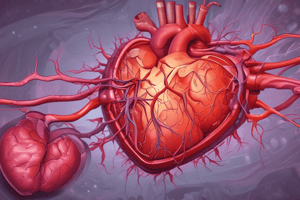Podcast
Questions and Answers
What is the main focus of CVS pathology?
What is the main focus of CVS pathology?
- The study of diseases affecting the heart and blood vessels (correct)
- The study of diseases affecting the nervous system
- The study of diseases affecting the lungs and respiratory system
- The study of diseases affecting the digestive system
Which of the following is an example of a cardiovascular disease?
Which of the following is an example of a cardiovascular disease?
- Arthritis
- Atherosclerosis (correct)
- Cirrhosis
- Pneumonia
What is the primary cause of myocardial infarction?
What is the primary cause of myocardial infarction?
- Buildup of plaque in the arteries
- Inflammation of blood vessels
- Damage to the heart valves
- Lack of blood flow to the heart muscle (correct)
Which of the following is a genetic factor that contributes to CVS pathology?
Which of the following is a genetic factor that contributes to CVS pathology?
What is the primary goal of diagnostic techniques in CVS pathology?
What is the primary goal of diagnostic techniques in CVS pathology?
What is a common treatment approach for CVS pathology?
What is a common treatment approach for CVS pathology?
Why is early diagnosis and treatment crucial in CVS pathology?
Why is early diagnosis and treatment crucial in CVS pathology?
What is the purpose of gross examination in CVS pathology?
What is the purpose of gross examination in CVS pathology?
Flashcards are hidden until you start studying
Study Notes
Introduction to CVS Pathology
- Cardiovascular system (CVS) pathology refers to the study of diseases affecting the heart and blood vessels.
- CVS pathology is a subspecialty of surgical pathology that deals with the diagnosis of cardiovascular diseases.
Types of CVS Pathology
- Atherosclerosis: the buildup of plaque in the arteries, leading to their hardening and narrowing.
- Myocardial infarction: damage to the heart muscle due to lack of blood flow, resulting in heart attack.
- Cardiomyopathy: diseases of the heart muscle, leading to heart failure.
- Valvular heart disease: disorders affecting the heart valves, leading to stenosis or regurgitation.
- Vasculitis: inflammation of blood vessels, leading to damage and narrowing.
Causes of CVS Pathology
- Genetic factors: inherited disorders, such as familial hypercholesterolemia.
- Lifestyle factors: smoking, high blood pressure, high cholesterol, diabetes, and obesity.
- Infections: bacterial, viral, or fungal infections, such as endocarditis.
- Autoimmune disorders: conditions where the immune system attacks the cardiovascular system.
Diagnostic Techniques
- Gross examination: visual examination of the heart and blood vessels.
- Microscopic examination: examination of tissue samples under a microscope.
- Imaging techniques: echocardiography, angiography, CT, and MRI scans.
- Laboratory tests: blood tests for lipid profiles, cardiac enzymes, and inflammatory markers.
Treatment and Management
- Medications: to control blood pressure, cholesterol, and lipids, and to prevent blood clots.
- Surgical interventions: coronary artery bypass grafting, heart transplantation, and valve repair or replacement.
- Lifestyle modifications: diet, exercise, and stress management.
Importance of CVS Pathology
- Early diagnosis and treatment: crucial for preventing complications and improving patient outcomes.
- Understanding disease mechanisms: essential for developing effective treatments and prevention strategies.
- Improving patient care: accurate diagnosis and management of CVS diseases can enhance patient quality of life.
Introduction to CVS Pathology
- Cardiovascular system (CVS) pathology studies diseases affecting the heart and blood vessels.
- It is a subspecialty of surgical pathology that diagnoses cardiovascular diseases.
Types of CVS Pathology
- Atherosclerosis: plaque buildup in arteries, causing hardening and narrowing.
- Myocardial infarction: heart muscle damage from lack of blood flow, leading to heart attack.
- Cardiomyopathy: diseases of the heart muscle, causing heart failure.
- Valvular heart disease: disorders affecting heart valves, leading to stenosis or regurgitation.
- Vasculitis: inflammation of blood vessels, causing damage and narrowing.
Causes of CVS Pathology
- Genetic factors: inherited disorders, such as familial hypercholesterolemia.
- Lifestyle factors: smoking, high blood pressure, high cholesterol, diabetes, and obesity.
- Infections: bacterial, viral, or fungal infections, such as endocarditis.
- Autoimmune disorders: conditions where the immune system attacks the cardiovascular system.
Diagnostic Techniques
- Gross examination: visual examination of the heart and blood vessels.
- Microscopic examination: examination of tissue samples under a microscope.
- Imaging techniques: echocardiography, angiography, CT, and MRI scans.
- Laboratory tests: blood tests for lipid profiles, cardiac enzymes, and inflammatory markers.
Treatment and Management
- Medications: controlling blood pressure, cholesterol, and lipids, and preventing blood clots.
- Surgical interventions: coronary artery bypass grafting, heart transplantation, and valve repair or replacement.
- Lifestyle modifications: diet, exercise, and stress management.
Importance of CVS Pathology
- Early diagnosis and treatment are crucial for preventing complications and improving patient outcomes.
- Understanding disease mechanisms is essential for developing effective treatments and prevention strategies.
- Accurate diagnosis and management of CVS diseases can enhance patient quality of life.
Studying That Suits You
Use AI to generate personalized quizzes and flashcards to suit your learning preferences.




